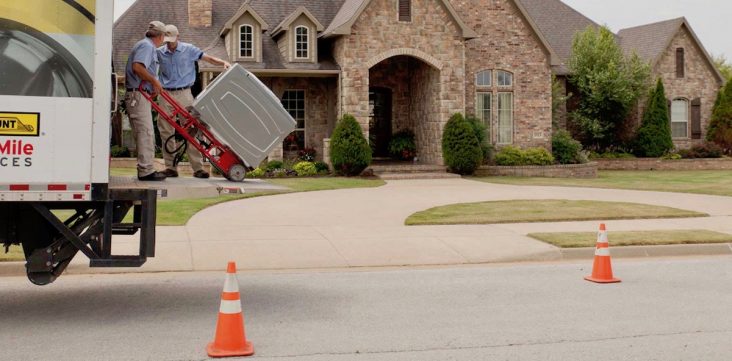Report: Retailers still face challenges in shipping oversize items bought online
by September 10, 2018 12:56 pm 1,461 views

photo courtesy of J.B. Hunt Final Mile Delivery Services
With more consumers willing to purchase large, bulky items online they are finding retailers struggling to deliver. A report from Austin, Texas-based uShip found 21% of U.S. adults who have purchased a large item online in the past year said it was damaged when received.
Another 15% said they never received the item. After making a purchase, 16% said they had to find their own transport for the oversized item delivery.
The report indicates the retail industry has yet to solve the challenge of shipping oversize products such as sofas, appliances, mattresses, treadmills or kayaks. The uShip report found 11% said they fought with customer service during the delivery process and 11% report wasting an entire day tracking down the shipment. There were 15% who said they missed work while waiting for a delivery and 13% said they kept the item, even if damaged, because the return process was too complicated.
With these reported issues, 28% said they are hesitant to buy an oversized item online because of the shipping uncertainties. Logistics firm uShip said the problem is fixable. The report found 28% of respondents would be happy with proactive updates on the progress of their shipment rather than having to research it themselves. About one in four said they would like to see more choice in how the item is delivered. About one in five said the process would be improved by having the oversized item directly delivered to their home.
Mike Williams, CEO of uShip, said the Amazon effect has resulted in a reset of online shopper expectations about how quick and cheap e-commerce purchases should arrive in their mailbox. Fast and free are the new normal, forcing all other online sellers to keep up. While the pressure is on for parcel delivery, he said for online furniture resellers, an Etsy shop owner, or a brick-and-mortar shop selling online, there is tremendous opportunity ahead, especially in furniture —one of the fastest growing segments of e-retail valued at $19.2 billion. By 2019 this segment is expected to reach $42 billion, according to eMarketer.
Williams said large-item logistics remain a black hole for most online sellers. There’s way more to consider when shipping a 250-pound couch cross country compared with cosmetics. Pickup and delivery schedules, insurance, assembly, and bottom-line transport cost are all friction-causing factors. He said with marketplaces like eBay or Craigslist, out-of-area buyers typically manage their own logistics, often preventing the sale.
“There’s no such thing as ‘free shipping.’ It’s just a matter of who pays,” Williams said.
The ‘last mile’ is a critical point in every customer’s lifecycle. When it comes to delivery, e-retailers can’t afford to skimp on innovation or ignore it, Williams said. It’s as much of a selling point as the product itself. Many turn to less-than-truckload (LTL) shipping options, concerned that “white glove service” will be more expensive — which is typically not the case. Without a turnkey, low-cost delivery option in place, there’s a chance the money spent acquiring customers will be for naught, Williams added.
UPS and FedEx deliver items up to 150 pounds to residences, but UPS recently announced a $150 fee for the delivery of oversized packages and pallets. Walmart and Amazon are testing last mile delivery using third-party startups, some with little or no logistics experience. Sam’s Club and Wayfair use LTL carriers including Fort Smith-based ArcBest to offer home deliveries via a white-glove service. Best Buy and other retailers use Lowell-based J.B. Hunt’s Final Mile white-glove delivery service.
Williams said uShip recently unveiled an in-home delivery service for large, heavy items bought online. This service is a fixed-price, white-glove service of bulky items such as office furniture.
“In an extremely competitive market, online sellers are scrambling for a turnkey logistics solution for oversized items, something Amazon, UPS and FedEx currently struggle to provide. We provide online retailers a white-glove service, lower, predictable delivery costs, and shortened transit times from our proven logistics platform and nationwide network of feedback-rated transporters,” Williams said.
In multiple surveys Deloitte found consumers are more interested in free shipping than fast shipping for an additional fee. Another recent survey by Radial found 60% of respondents expect free shipping as well as the lowest possible price. Less than one in four said they are willing to pay up to $10 in shipping costs and believe retailers should foot the bill on large ticket items.
”While Amazon is constantly pushing the logistics envelope, they only dominate in standard-size shipping. There’s still no clear winner in the historically challenging oversized delivery game,” said Van Leigh, senior vice president of marketing at uShip.
